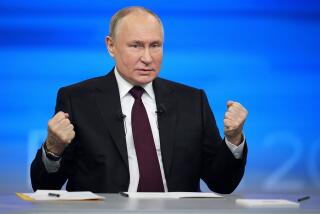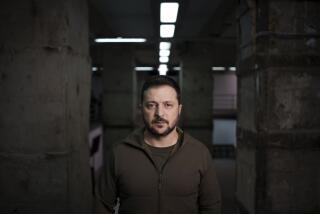Gorbachev Vows to Freeze Prices, Boost Food Output
- Share via
MOSCOW — President Mikhail S. Gorbachev, again confronted by popular complaints of rising prices, shortages of consumer goods and the failure of his reforms to improve everyday life, promised Monday that there will be no price increases for at least two or three years.
He also said the government would make increased food supplies its first priority.
Gorbachev, visiting the Ukrainian capital of Kiev, told crowds in the streets that far-reaching changes in agricultural policy will be introduced at a special meeting of the Communist Party’s Central Committee next month and that these will lead to further economic reforms.
Clearly struggling to raise morale as the country’s economic crisis deepens despite the reforms, Gorbachev pleaded: “Don’t lose heart, comrades.
“We are passing through the most difficult years now,” he continued. “But we have been through ordeals that were a matter of life or death for us, and we coped. Now, the matter is not really life or death but the fate of the nation and of the people.”
With the Communist Party facing its first competitive, multi-candidate, national parliamentary election in Soviet history, Gorbachev was also on the campaign trail, seeking support not so much for party candidates but trying to renew enthusiasm for perestroika , his program of political, economic and social restructuring.
“If you don’t like what is happening, then get together and deal with it,” Gorbachev told the crowd in one of the segments broadcast by Soviet television Monday evening. “It is up to every one of us--me, you, everyone. Otherwise nothing will come of it all.”
Most of the people agreed, but a woman called out, “But the people are still afraid--they are very much afraid.”
Meanwhile, demonstrations are reported to be under way in central Kiev against the nomination of Vladimir V. Shcherbitsky, the Ukrainian party leader and Gorbachev’s host, and other senior party officials as candidates for the new Parliament.
About 5,000 protesters gathered in October Revolution Square on Monday, more than twice the figure who had come on Sunday, to protest Shcherbitsky’s nomination, according to political dissidents here. Police made no effort to break up the demonstrations, which organizers said would continue until the elections March 26.
According to recent reports in the official Soviet news media, Ukrainian party officials under Shcherbitsky, whose tenure dates back to what is now officially known as “the period of stagnation,” are acting methodically to reduce the number of candidates to a single party representative in almost every constituency.
Urged Protests
“If this is happening, then it is wrong,” Gorbachev said, but he added that local residents must make their own protests and take their own action to correct the situation.
“Let’s resolutely change the way we live,” Gorbachev had told the crowd, which was just a few blocks from the anti-Shcherbitsky demonstration. “Let’s restructure our lives. Let’s develop new forms of organization. But it is a serious and crucial matter, however, not to draw the country into an even worse situation.”
For that reason, despite the government’s huge budget deficit, which now approaches an estimated $160 billion a year, and despite calls by many leading economists for fundamental price reform, Gorbachev pledged there would be no price increases.
Pressed hard by the large, jostling crowd that surrounded him in a central Kiev square, Gorbachev said: “You must not be concerned about prices. If we do conclude that they have to be changed in some way--not just increased, but even changed somehow--then we will do that only when it has been discussed by the people.
“If the people are opposed to it, then (prices) must not be touched. . . . Therefore, as we look at it, for two or three years, this talk (of price increases) must be dropped altogether.”
Recalled Previous Heckling
With this comment and others, Gorbachev appeared to reflect the decisions made last week by the party’s ruling Politburo on the Soviet Union’s strategy for medium-term economic development. The often sharp questioning Gorbachev received recalled the heckling he underwent on a similar trip in September to the Siberian city of Krasnoyarsk--now a political milestone here.
“Work has to be done to ensure there is more food and more of all other goods,” Gorbachev said, responding to complaints of the multiplying shortages that, with inflation, are undermining popular confidence in his reform program. “The market must be saturated. That is the main thing. Production must be increased and costs reduced--that is what has to be done.
“For the time being, incomes must not be pushed too far. Productivity rose by 5.6% (in 1988)--that is good. But incomes rose by 9%. If we are going to walk down that path and receive that kind of income, then there will be a lot of bank notes, but there will not be any goods to buy with them.”
But Gorbachev affirmed the leadership’s determination to continue freeing the Soviet economy from the rigid planning and management system that has evolved over the past seven decades. “We are going to alter all the present (economic) relationships,” he said. “There will be big changes, I promise you. . . .
“If someone wants to lease the land and farm it, let him,” Gorbachev continued, referring to the planned changes in agricultural policy. “If someone wants to form a cooperative, let him. And if someone wants to farm by himself or with his family, let him. The main thing is for everyone to become involved.”
Gorbachev plans to make his first visit to the site of the 1986 nuclear disaster at Chernobyl, which is about 60 miles north of Kiev, during the trip. Questioned about a controversial new nuclear power plant in the Crimea, he said that, although work is continuing, the project is being reevaluated by American and Japanese specialists as well as Soviet technicians and will be abandoned if it poses any danger.
More to Read
Sign up for Essential California
The most important California stories and recommendations in your inbox every morning.
You may occasionally receive promotional content from the Los Angeles Times.













